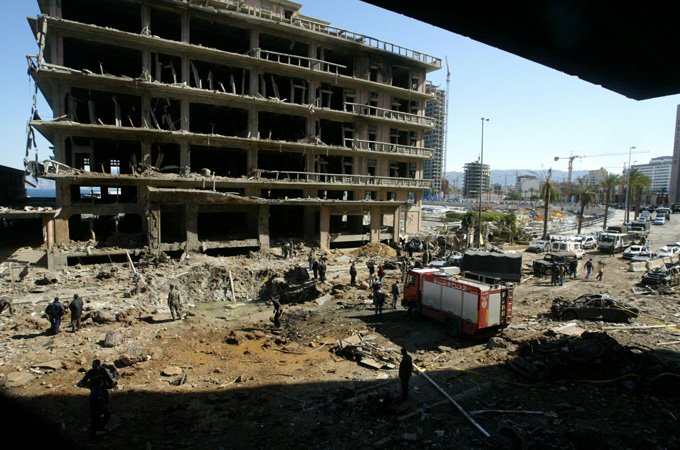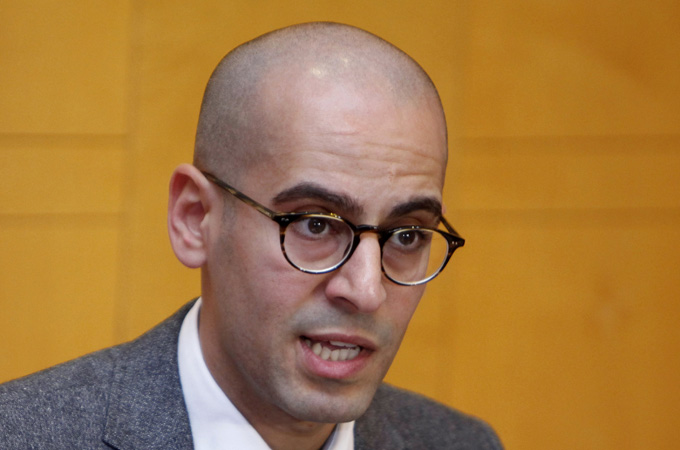Lebanon assassination probe targets reporters
Lebanon tribunal in The Hague has charged journalists for tampering with justice during probe into Rafik Hariri killing.

The Hague, Netherlands – A prominent Lebanese broadcast journalist has pleaded not guilty in a court case that has created a rift between Lebanon and the tribunal in The Hague investigating former prime minister Rafik Hariri’s killing in 2005.
The Special Tribunal for Lebanon, based in The Hague, charged Karma al-Khayat and another high-profile journalist, Ibrahim al-Amin, with contempt and interfering with the administration of justice in January. The two reporters and their media organisations are accused of having published the names of people said to be witnesses.
Al-Khayat, the 31-year-old vice chairwoman of Al Jadeed TV, and al-Amin, the Lebanese daily Al Akhbar’s editor-in-chief, face up to seven years in prison, or a fine of up to 100,000 euros ($138,000) if found guilty.
The indictment has raised tensions between the tribunal and Lebanon, and the government has accused the court of violating press freedom and national sovereignty.
Our only crime is that we respected the highest standards of our profession, and we highlighted some of the mistakes of this court.
On Tuesday, al-Khayat made her first appearance in court and denied all accusations. “Our only crime is that we respected the highest standards of our profession, and we highlighted some of the mistakes of this court,” she said.
Mysterious witness list
The Special Tribunal for Lebanon (STL) in The Hague is prosecuting the assassination of Hariri and 22 others who were killed in a massive bomb blast that rocked the heart of Lebanon’s capital, Beirut, on February 14, 2005. The trial against several members of the Shia movement Hezbollah opened in January without the five accused present.
The UN Security Council established the tribunal in 2007 at the request of the Lebanese government. It is the first international tribunal to deal with “terrorism” and applies a mixture of Lebanese and international law.
“It’s our job as journalists to be critical,” al-Khayat told Al Jazeera before her court appearance. She and her colleagues at Al Jadeed TV had received a list from an anonymous source who claimed the people were witnesses in the Hariri murder trial. The journalists then approached the named individuals to verify the information, al-Khayat said.
In August 2012, Al Jadeed TV broadcast five episodes titled: “The Witnesses of the International Tribunal.” Al-Khayat said the peoples’ faces had been pixelated and no names were disclosed to protect their identities.
In January 2013, Al Akhbar published photos, professions, dates of birth and other personal information of 32 people it claimed to be witnesses. Al Akhbar is seen as a pro-Hezbollah newspaper, and has been one of the harshest critics of the special tribunal.
While al-Khayat appeared in The Hague on Tuesday, al-Amin refused to follow the court order. He remained absent and requested in a letter more time to prepare for his defence. The judge has scheduled another hearing for al-Amin on May 29, and could get an arrest warrant to ensure he shows up.
Difficult issues
As a novelty in international criminal law, the media companies have been charged with the same offences as their journalists. According to legal scholars, this could make it theoretically possible to not only hold people accountable for war crimes or other international crimes, but also companies.
 |
| The scene where a massive car bomb blew up the motorcade of former prime minister Rafik Hariri on February 14, 2005 [Reuters] |
The case against the journalists touches also on the difficult issue of how to balance press freedom and a proper functioning of the courts.
The Special Tribunal for Lebanon and others such as the International Criminal Court rely heavily on witnesses to take the stand in The Hague.
Because of the highly politicised and controversial cases, witnesses often need special protection. Some are assigned pseudonyms, or testify with voice distortion or behind a curtain. Where people risk serious harm or death in their communities, they are even relocated to start a new life in a different country.
In the case against al-Khayat and al-Amin, the functioning of the court has been at stake and, therefore, “freedom of the press must find its limits”, the judge wrote in the indictment.
The tribunal’s decision has led to heated debate in Lebanon, a country often seen as the freest in the Middle East with a reputation for free speech. In Beirut, journalists have rallied in solidarity with al-Khayat and al-Amin.
The National Audio-Visual Council, a Lebanese media watchdog, condemned the tribunal’s decision and said the indictments constitute a breach of Lebanon’s sovereignty and a violation of freedom of the press. The tribunal has become “a tool of foreign tutelage over Lebanon and the Lebanese”, it said.
Several members of parliament have asked the government to intervene.
“The STL is attacking the freedom of the press, and today we – representing parliamentary blocs – are here to defend Lebanon,” Hassan Fadlallah from the Hezbollah opposition was quoted as saying. “Ibrahim al-Amin and Karma al-Khayat are the targets today, but others might be in the future.”
Lebanon’s Information Minister Ramzi Joreige said he supports the journalists, but urged them to follow the tribunal’s orders. “There are a lot of objections to summoning journalists from Al Jadeed and Al Akhbar; they should express their objections in court,” Joreige said.
Al-Khayat said their case has wider implications for journalists and media organisations around the world.
“This case is not about us, it’s about every journalist covering the tribunal,” al-Khayat said at the hearing. “Instead of prosecuting journalists, the tribunal should seek to find its leaks.”
Anonymous leaker
It remains unclear whether the names published are real witnesses. Marten Youssef, the tribunal spokesman, wouldn‘t confirm or deny the list’s authenticity. Youssef also ruled out the possibility that staff members were involved in leaking the list.
 |
| Special Tribunal for Lebanon spokesman Marten Youssef dismissed suggestions the witness list was leaked by staff [Reuters] |
“The charge is not the leaking of information, or the publication of leaked material,” Youssef told Al Jazeera. Rather, the publication of names stating that the people are witnesses is considered damaging to the trial, he said. “The confidence that the tribunal is able to protect its witnesses is diminished by this publication.”
Witness protection is at the core of a functioning trial, said Karlijn van der Voort and Anne-Marie Verwiel, two international lawyers monitoring the Hariri trial in The Hague. Therefore, international courts and tribunals have the scope to prosecute such interference, they said.
The legal experts argued in the case against the Lebanese journalists, press freedom is not at stake.
“One should distinguish between publishing confidential court information and criticising the tribunal,” van der Voort told Al Jazeera. “The latter is allowed, but the publication of names of potential witnesses is simply one step too far.”
Witness protection is one of the main issues at every international court, with the International Criminal Court also experiencing serious challenges. The case against the Kenyan President Uhuru Kenyatta and his deputy William Ruto is almost collapsing after several witnesses withdrew over security fears.
In September, a woman took the stand and testified against Ruto, who faces charges of crimes against humanity in The Hague. She was only referred to as “Witness P0536”, her face was pixelated and her voice distorted. However, within a few hours bloggers had revealed her real identity.
While Youssef dismissed the suggestion that the witness list was leaked from within, the Special Tribunal for Lebanon has experienced earlier leaks. In 2009, German weekly Der Spiegel revealed that the investigation points to Hezbollah members as alleged perpetrators of Hariri’s assassination. Another report by the Canadian public broadcaster CBC in 2010 also disclosed insider information about the investigation.
The German and Canadian journalists didn’t face prosecution, al-Khayat said.
“The question why the tribunal prosecutes Lebanese journalists remains unanswered,” she said.
Follow Benjamin Dürr on Twitter: @benjaminduerr